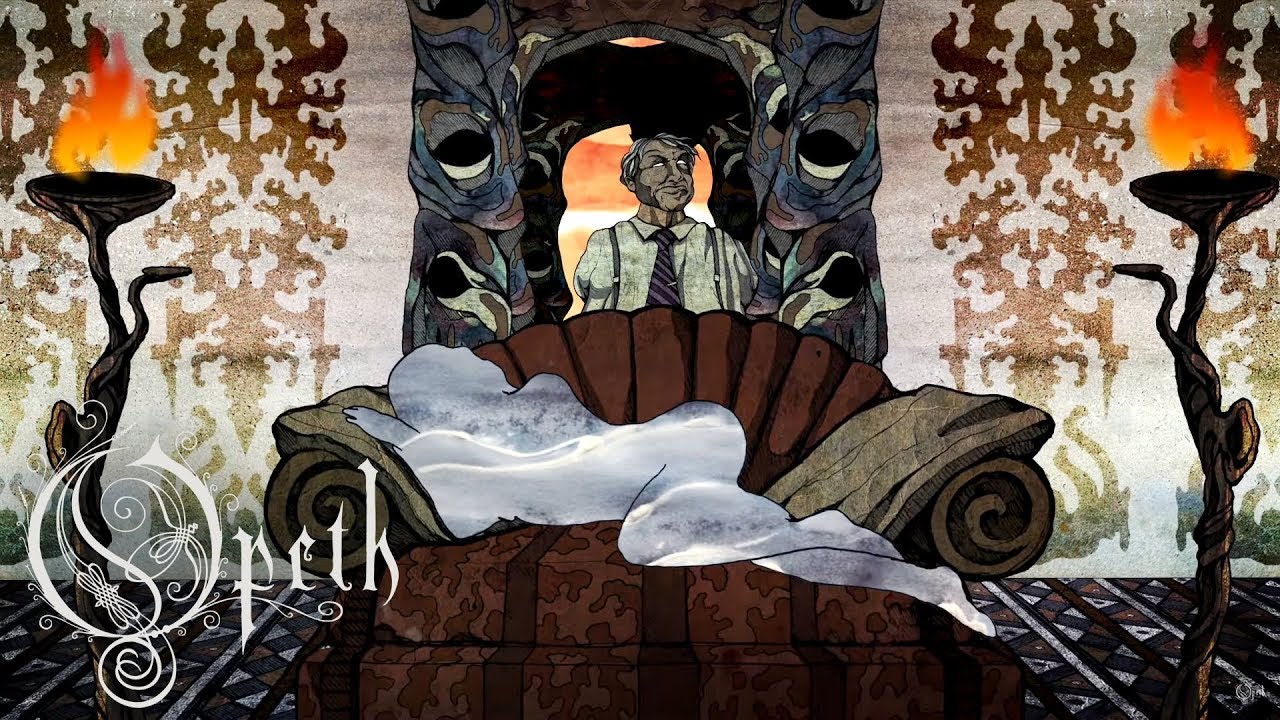With the release of In Cauda Venenum, we are now four albums deep into Opeth’s discography sans extreme metal. And yet, many fans of the Swedish band’s earlier albums will still bray online about the lack of blast-beats, Azagthothian riffs, and death growls on Opeth’s latest progressive rock LP – eleven years on since those elements last appeared on record.
Without question, Opeth – a band that truly deserves the much-abused “progressive” tag – existed on a different plane than most of their extreme metal peers during the mid-90s/00s. Their sense of the baroque, their Scandinavian/British folk flourishes, the musty draw of their keen Jethro Tull/Rush/Camel/Yes/King Crimson prog gestures, their psychedelic and hard rock touches… were all just as essential to the band’s distinctive sound as the death metal that acted as its incendiary grounding.
Interestingly, unlike Alcest, the French post-black metal band that suppressed their metal side on 2014’s Shelter while fully illuminating their shoegaze inspirations, only to swiftly revert back, Opeth didn’t lose what made them so idiosyncratic when they sidestepped extremity; the sense of compositional adventure and the dexterous, magical musicianship continued, albeit in a different form, with altered or enhanced dimensions. While Sorceress (2016) leaned profoundly on psychedelic rock, classic rock and neofolk influences and was perhaps too understated and dour following the sublimely elaborate prog expanse of Pale Communion (2014), In Cauda Venenum is another imposing milestone in Opeth’s rather gleaming back catalogue.
It is also a record that was not planned or rushed. Maestro Mikael Åkerfeldt had told everyone involved in Opeth – from bandmates to managers, to label-heads at Nuclear Blast – that he was going on sabbatical, but the mundanity of regular modern life soon proved too much. Within two months, he was secretly crafting new music, freed from business pressures and all fan expectations, and focused on a new challenge: writing the first Opeth album in Swedish.
Possibly inspired by the traditions of obscure 1970s Italian prog acts that sang in their native tongue, such as (early) Premiata Forneria Marconi or Museo Rosenbach, Åkerfeldt’s natural vocal inflections are very intriguing on this record, adding an exotic touch for non-Swedish fans. But for those who find it a bit distracting hearing Opeth songs sung in such a manner, this album comes with an English version – a safety net of sorts.
Truth be told, outside the obvious language differences, there isn’t much distinction between the two versions. This is a credit to Åkerfeldt’s ability to mirror the meter of the often-stunning clean vocal melodies and harmonies. However, we don’t get to experience the new facet of their sound until after opener ‘Livets trädgård / Garden Of Earthly Delights’, a Tangerine Dream meets John Carpenter synth-intro replete with recordings of church bells, birdsong and human clatter.
It sets the tone for ‘Svekets prins / Dignity’, where knotted keyboard-driven grooves overlap, twist and shapeshift seamlessly, running into a stuttering bass and jazzy drum pattern. A crystalline guitar solo from Fredrik Åkesson then emerges (a direct contrast to his later ball-bustin’ screed on ‘Kontinuerlig drift / Continuum’), followed by a heavy-set riff sections which descends into a lullaby of acoustic guitars and Åkerfeldt’s first proper turn on the mic. From there, a sultry rock groove bolsters impassioned singing with more grit and volume, and the orchestral accompaniments add an arcane, regal allure.
The remainder of this sixty-seven-minute album plays out in equally heady fashion, where the bass of Martín Méndez and keyboards of Joakim Svalberg take on a huge role of leading quite a few of the arrangements, backed by the powerful and stylistically vast drumming of Martin Axenrot. Those three players form an unbelievably dynamic rhythmic spine throughout. Particularly so on the juddering sections of ‘Hjärtat vet vad handen gör / Heart In Hand’ – which even has a raging double bass passage – and most impactfully, on the heaviest Opeth track, sonically-speaking, since Watershed in 2008, ‘Charlatan’. The evil Meshuggah-ed syncopations of ‘The Grand Conjuration’ (a highlight from 2005’s Ghost Reveries) sound skewed by Magma and Deep Purple here, if they took bad acid during Midsommar festivities.
If all of that isn’t intoxicating enough, ‘Ingen sanning är allas / Universal Truth’ encompasses many movements of various timbre that roll together in dizzying effect, yet make complete compositional sense, while the ultra-smooth ‘Banemannen / The Garroter’ sounds like Opeth performing as His Infernal Majesty’s lounge-jazz house band. Both go towards setting up finale ‘Allting tar slut / All Things Will Pass’, which booms as a doom symphony of Sabbathian wonder while still proving itself as textural as the preceding tracks.
If there are any minor criticisms to be levelled at In Cauda Venenum, though, it’s that perhaps a few of the songs are slightly over-baked. For example, the aforementioned ‘Hjärtat vet vad handen gör / Heart In Hand’ encroaches worryingly close to Eurovision fare near its conclusion and would benefit from surgical intervention. As would some of the ascending and descending riff repetitions of ‘De närmast sörjande / Next of Kin’, since the Magma-esque track had already covered plenty of fertile ground. But in terms of general prog-excess, Opeth’s thirteenth studio album is still more concise than the genre’s norm.
Åkerfeldt, who puts in another powerhouse vocal performance, has confirmed to the press that this record was a lot of fun to make. You can hear his glee across it – there is a playful freedom on display from start to finish. By increasing the importance of the bass and keyboards (a move possibly inspired by fellow Swedish prog compatriots Anekdoten) and simultaneously writing with string arrangements in mind, the innate grandeur at the heart of this band’s music has never been as audible as it is now.
In their prog rock guise, Opeth continue to write timeless-sounding albums, ripe with grandstanding melody and colourful multi-part movements. If this is what Opeth sound like on holiday-mode, then it’s clear that Åkerfeldt needs to go on sabbatical more often.



